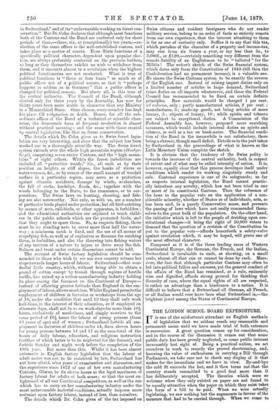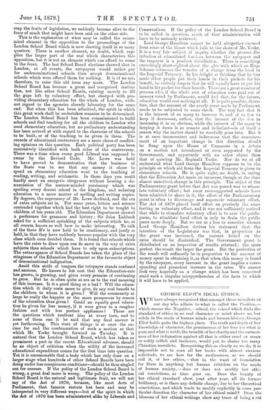THE LONDON SCHOOL BOARD EXPENDITURE.
IT is one of the misfortunes attendant on English methods of legislation that we seldom reach any reasonable and permanent mean until we have made trial of both extremes in succession. A great question comes up for consideration, and in the course of the discussion it comes out that some public duty has been grossly neglected, or some public interest inexcusably lost sight of. Being a practical nation, we set ourselves to work to remedy the proved shortcoming, and, knowing the value of enthusiasm in carrying a Bill through Parliament, we take care not to check any display of it that makes for the immediate end we have in view. By-and-bye the cold fit succeeds the hot, and it then turns out that the country stands committed to a good deal more than it has deliberately accepted. The theories which were so welcome when they only existed on paper are not found to be equally attractive when the paper on which they exist takes the form of a bill to be paid. When we were actually legislating, we saw nothing but the arguments in favour of the measure that had to be carried through. When we come to
reap the fruits of legislation, we suddenly become alive to the force of much that might have been said on the other side.
This is the explanation of what may be called the econo- mical element in the opposition to the proceedings of the London School Board which is now showing itself in so many quarters. There is another element, no doubt, which sup- plies the larger part of the zeal which characterises this opposition, but it is not an element which can afford to come to the front. The last School Board elections showed that in London, at all events, the ratepayers would rather pay for undenominational schools than accept denominational schools which were offered them for nothing. It is of no use, therefore, to raise this old issue any more. The London School Board has become a great and recognised institu- tion, not like other School Boards, existing merely to fill the gaps left by voluntary effort, but charged with pro- viding elementary education for the whole of London, with- out regard to the agencies already labouring for the same end. But when this has been admitted, the spirit in which this great work shall be undertaken remains to be determined. The London School Board has been commissioned to build schools and find teaching for all .the children in London who need elementary education, but no preliminary understanding has been arrived at with regard to the character of the schools to be built, or of the teaching to be given in them. The records of educational controversy are a mere chaos of conflict- ing opinions on this question. Each political party has been successively identified with both sides of the controversy. There was a time when every good Liberal was supposed to swear by the Revised Code. Mr. Lowe was held to have proved to demonstration that the business of the State was to see that any money it chose to spend on elementary education went to the teaching of reading, writing, and arithmetic. In those days you could hardly meet an energetic clergyman without hearing a de- nunciation of the narrow-minded parsimony which was spoiling every decent school in the kingdom, and reducing education to a mere matter of spelling and writing copies. By degrees, the supremacy of Mr. Lowe declined, and the era of extra subjects set in. For some years, letters and science contended together which had the best right to be taught to children of ten years old. The Education Department showed a preference for grammar and history ; Sir John Lubbock asked for a sufficient sprinkling of the subjects which he, at all events, knows so well how to make interesting. To talk of the three R's is now held to be reactionary, and justly so held, in that they have suddenly become popular with the very class which once derided them. It is found that schools which have the rates to draw upon can do more in the way of extra subjects than schools which have to rely upon subscriptions. The extravagance of School Boards has taken the place of the stinginess of the Education Department as the favourite object of denominational indignation.
Amid this strife of tongues the ratepayer stands confused and anxious. He knows to his cost that the Education-rate has grown, is growing, and gives every promise of continuing to grow. But he is often quite at sea as to the real meaning of this increase. Is it a good thing or a bad? Will the educa- tion which it daily costs more to give, do any real benefit to the children to whom it is given ? Will the community at large be really the happier or the more prosperous by reason of the education thus given ? Could an equally good educa- tion be given for less money, if it were given in a rougher
fashion and with less perfect appliances ? These are the questions which confront him at every turn, and to none of them can it be said that any final answer is yet forthcoming. This state of things is at once the ex- cuse for and the condemnation of such a motion as that which Mr. Yorke brought forward on Tuesday. It is natural that the London School Board, which has taken so prominent a part in the recent Educational advance, should be an object of criticism when the utility of the increased educational expenditure comes for the first time into question. Yet it is unreasonable that a body which has only done on a larger stage what hundreds of other School Boards have been doing under less conspicuous conditions—should be thus singled out for censure. If the policy of the London School Board is wrong, a great deal more is wrong. The policy of the London School Board is the natural and legitimate fruit, we will not say of the Act of 1870, because, like most Acts of Parliament, that famous statute has been and may be interpreted in very different ways—but of the spirit in which the Act of 1870 has been administered alike by Liberals and
Conservatives. If the policy of the London School Board is to be called in question, much of that administration will have to be seriously reviewed.
Lord George Hamilton cannot be held altogether excused from some of the blame which falls to the share of Mr. Yorke.
It is a very fair subject of inquiry whether the present dis- tribution of educational burdens between the ratepayer and the taxpayer is a prudent distribution. There is something exceedingly short-sighted about the glee with which an Eng- lishman witnesses the transfer of a charge from the local to the Imperial Treasury. In his delight at thinking that lie has made other people put their hands in their pockets for his benefit, he entirely forgets that he will equally have to put his hand in his pocket for their benefit. There are a great number of
persons who, if the whole cost of education were paid out of moneys voted by Parliament, would feel that, for the future,
education would cost nothing at all. It is quite possible, there- fore, that the amount of the yearly grant made by Parliament needs to be subjected to some check. The very fact that it is the interest of so many to increase it, and of so few to keep it down—or, rather, that the interest of the few in increasing it is so obvious, while the interest of the many in keeping it down is so remote and indistinct—is of itself a reason why the matter should be carefully gone into. But it is at once inconvenient and indecorous that the announce- ment of an important change in this direction should be flung upon the House of Commons in a debate on a motion not introduced or even supported by the Government, and apparently with no other object than that of quieting Mr. Reginald Yorke. Nor do we at all understand what Lord George Hamilton supposes to be the principle on which aid from the Imperial Treasury is given to elementary schools. He is quite right, no doubt, in saying that the Education Act made an immense, though at the time almost unnoticed, change in this principle. The object of the Parliamentary grant before that Act was passed was to stimu- late voluntary effort ; but since rate-supported schools have been admitted to share in it, the effect of the Parliamentary grant is often to discourage and supersede voluntary effort. The Act of 1870 placed local effort on precisely the same footing as voluntary effort, and it was not sufficiently noticed that while to stimulate voluntary effort is to save the public purse, to stimulate local effort is only to drain the public purse more deeply. But we are at a loss to conceive whence Lord George Hamilton derives his statement that the intention of the Legislature was that, in proportion as
the grant was increased, the amount levied on the rates should be diminished. The Government grant is distributed on an inspection of results attained ; the more perfect the result the larger the grant. But the perfection of
the result will ordinarily be in proportion to the amount of money spent in obtaining it, so that when this money is found by the ratepayer, every increase in the grant implies a corre- sponding and precedent increase in the rates. We cannot look very hopefully on a change which has been conceived amid such a singular misapprehension of the facts to which it will have to be applied.



































 Previous page
Previous page